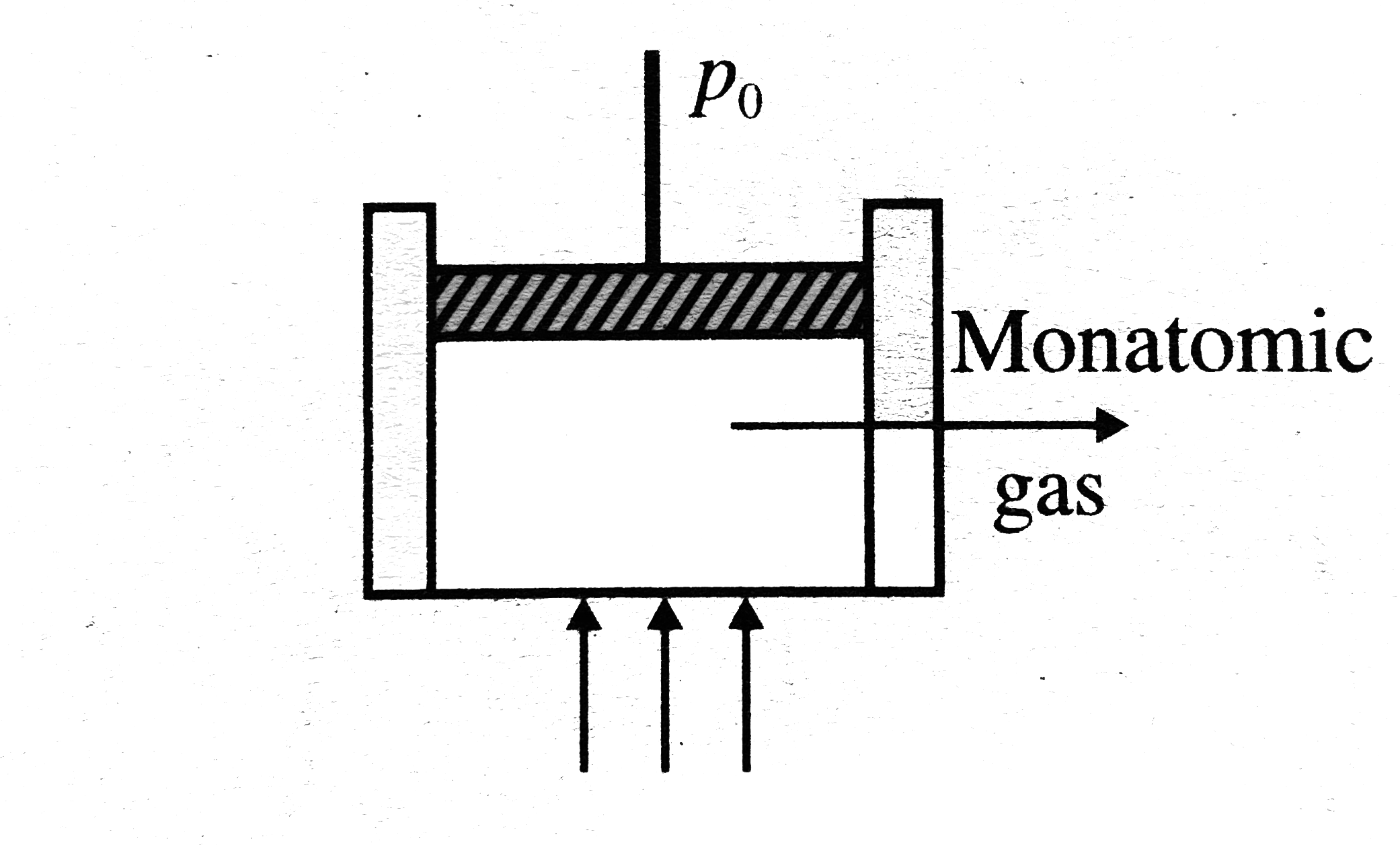The work done in adiabatic compression of 2 mole of an ideal monoatomic gas by constant external pressure of 2atm starting from initial pressure of 1atm and initial temperature of 30K(R=2cal/mol-degree)
36 cal
72 cal
80 cal
100 cal
The correct Answer is:B
To solve the problem of calculating the work done in the adiabatic compression of 2 moles of an ideal monoatomic gas, we will follow these steps:
Step 1: Understand the Process
In an adiabatic process, there is no heat exchange with the surroundings (Q = 0). According to the first law of thermodynamics, the change in internal energy (ΔU) is equal to the work done (W) on the system:
ΔU=W
Step 2: Calculate Change in Internal Energy
For an ideal monoatomic gas, the change in internal energy can be expressed as:
ΔU=nCvΔT
where:
- n = number of moles (2 moles)
- Cv = molar heat capacity at constant volume for a monoatomic gas = 32R
- R = gas constant = 2 cal/(mol·K)
- ΔT=T2−T1
Step 3: Determine Initial and Final Temperatures
We are given:
- Initial temperature T1=30K
- We need to find the final temperature T2.
Step 4: Use Ideal Gas Law to Relate Pressures and Volumes
Using the ideal gas law, we can express the volumes:
V=nRTP
Thus, we can write:
V1=nRT1P1
V2=nRT2P2
where:
- P1=1atm
- P2=2atm
Step 5: Calculate Change in Volume
The change in volume ΔV is:
ΔV=V2−V1=nRT2P2−nRT1P1
Step 6: Substitute Values into the Work Equation
The work done on the gas during adiabatic compression against a constant external pressure is given by:
W=−PexternalΔV
Substituting Pexternal=P2:
W=−P2(nRT2P2−nRT1P1)
Step 7: Solve for Final Temperature
By equating the expressions for change in internal energy and work done:
nCv(T2−T1)=−P2(nRT2P2−nRT1P1)
Substituting Cv and simplifying will allow us to solve for T2.
Step 8: Calculate Work Done
Once T2 is found, substitute back into the equation for work done:
W=nCv(T2−T1)
Step 9: Final Calculation
Substituting all known values will yield the final work done in calories.
Final Answer
After performing the calculations, the work done in the adiabatic compression is found to be 72cal.
---
In an adiabatic process, there is no heat exchange with the surroundings (Q = 0). According to the first law of thermodynamics, the change in internal energy (ΔU) is equal to the work done (W) on the system:
ΔU=W
For an ideal monoatomic gas, the change in internal energy can be expressed as:
ΔU=nCvΔT
where:
- n = number of moles (2 moles)
- Cv = molar heat capacity at constant volume for a monoatomic gas = 32R
- R = gas constant = 2 cal/(mol·K)
- ΔT=T2−T1
We are given:
- Initial temperature T1=30K
- We need to find the final temperature T2.
Using the ideal gas law, we can express the volumes:
V=nRTP
Thus, we can write:
V1=nRT1P1
V2=nRT2P2
where:
- P1=1atm
- P2=2atm
The change in volume ΔV is:
ΔV=V2−V1=nRT2P2−nRT1P1
The work done on the gas during adiabatic compression against a constant external pressure is given by:
W=−PexternalΔV
Substituting Pexternal=P2:
W=−P2(nRT2P2−nRT1P1)
By equating the expressions for change in internal energy and work done:
nCv(T2−T1)=−P2(nRT2P2−nRT1P1)
Substituting Cv and simplifying will allow us to solve for T2.
Once T2 is found, substitute back into the equation for work done:
W=nCv(T2−T1)
Substituting all known values will yield the final work done in calories.
After performing the calculations, the work done in the adiabatic compression is found to be 72cal.
Topper's Solved these Questions
Similar Questions
One mole of an ideal monoatomic gas at 27∘ C expands adiabatically against constant external pressure of 1 atm from volume of 10 dm3 to a volume of 20dm3.
View SolutionCalculate q,w, and ΔU for the isothermal reversible expansion of one mole of an ideal gas from an initial pressure of 2.0 bar to a final pressure of 0.2 bar at a constant temperature of 273K.
View Solution
Knowledge Check
What is the work done when 1 mole of a gas expands isothermally from 25 L to 250 L at a constant pressure of 1 atm and a temperature of 300 K ?
A(a) −3542JB(b) −5744JC(c) −2657JD(d) −4890J
One mole of an ideal gas (Cv,m=52R) at 300 K and 5 atm is expanded adiabatically to a final pressure of 2 atm against a constant pressure of 2 atm. Final temperature of the gas is :
View SolutionWhen 1mol of a monoatomic ideal gas at TK undergoes adiabatic change under a constant external pressure of 1atm, changes volume from 1L→2L. The final temperature (in K) would be
View SolutionWhen 1mol of a monoatomic ideal gas at TK undergoes adiabatic change under a constant external pressure of 1atm, changes volume from 1L→2L. The final temperature (in K) would be
View SolutionOne mole of an ideal monoatomic gas at temperature T and volume 1L expands to 2L against a constant external pressure of one atm under adiabatic conditions, then final temperature of gas will be:
View SolutionOne mole of an ideal monoatomic gas at temperature T and volume 1L expands to 2L against a constant external pressure of one atm under adiabatic conditions, then final temperature of gas will be:
View SolutionCalculate the work done by 1.0mol of an ideal gas when it expands at external pressure 2atm from 10atm to 2atm at 27∘C
View SolutionIf 50cal of heat is supplied at constant pressure to the system containing 2mol of an ideal monatomic gas, the rise in temperature is (R=2cal/mol−K)

View Solution
